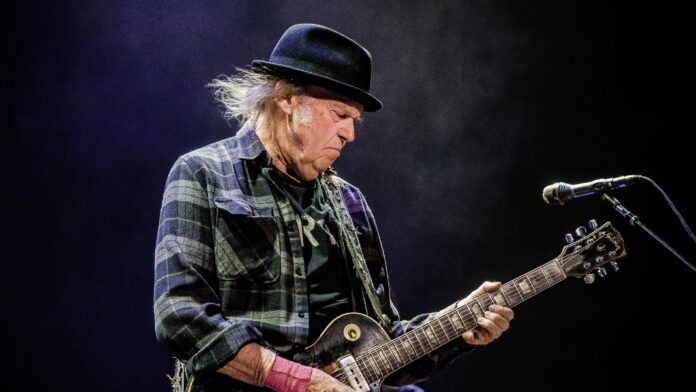Neil Young said he will remove his songs from Amazon Music over economic and political concerns, marking his latest campaign against a major tech company.
The Canadian and American singer-songwriter disclosed his decision in an October 8 post on his website, urging fans to abandon Amazon and its subsidiaries including Whole Foods Market.
The removal of his music from Amazon Music would affect subscribers’ access to a catalog of work spanning six decades, including solo hits like Old Man and Harvest Moon.
Young criticized Amazon founder Jeff Bezos for supporting the Trump administration, while also referencing a government shutdown that he said affected income, safety, and healthcare security for families.
He wrote: “Forget Amazon and Whole Foods. Buy local. Buy direct. Bezos supports this government. It does not support you or me.”
He added: “The time is here. Forget Amazon. Soon my music will not be there. It is easy to buy local. Support your community. Go to the local store. Don’t go back to big corporations who have sold out America.”
“Forget Amazon and Whole Foods. Buy local. Buy direct. Bezos supports this government. It does not support you or me.”
Neil Young
He continued: “We all have to give up something to save America from the Corporate Control Age it is entering. They need you to buy from them. Don’t.”
Young did not specify whether his move would affect only Amazon Music’s streaming service or extend to physical albums and merch sold through Amazon’s marketplace.
The artist has repeatedly withdrawn his music or abandoned social media platforms over political and ethical disagreements. In early 2022, he pulled his catalog from Spotify after accusing the streaming giant of allowing podcaster Joe Rogan to spread misinformation about COVID-19 vaccines.
“The time is here. Forget Amazon. Soon my music will not be there. It is easy to buy local. Support your community. Go to the local store. Don’t go back to big corporations who have sold out America.”
Neil Young
After an absence of more than two years, his music returned to Spotify, writing in March 2024: “My decision comes as music services Apple and Amazon have started serving the same disinformation podcast features I had opposed at Spotify.”
He added at the time: “I cannot just leave Apple and Amazon, like I did Spotify, because my music would have very little streaming outlet to music lovers at all, so I have returned to Spotify, in sincere hopes that Spotify sound quality will improve and people will be able to hear and feel all the music as we made it.”
Most recently in August, Young announced that he was leaving Facebook, citing objections to the Meta-owned platform’s AI chatbot. The Neil Young – Reprise Records page on Facebook wrote: “At Neil Young’s request, we are no longer using Facebook for any Neil Young-related activities. Meta’s use of chatbots with children is unconscionable. Mr. Young does not want a further connection with Facebook.”
He also abandoned X or Twitter in late 2023 after Elon Musk was reported to have endorsed an anti-Semitic conspiracy theory. He wrote at the time: “We are stopping all use of X we can control. For reasons that should be obvious to the richest man on Earth, we are taking this action against his company.”
Young’s move against Amazon marks the latest in the growing boycott of music streaming platforms. In August, Canadian post-rock band Godspeed You! Black Emperor pulled nearly their entire discography from major streaming services including Spotify, Tidal and Amazon Music, without providing a reason. The band’s music remains available for purchase and streaming through direct-to-fan platform Bandcamp.
In July, Australian rock band King Gizzard & The Lizard Wizard withdrew their music from Spotify in protest over CEO Daniel Ek‘s investment in European defense technology company Helsing, founded in 2021, which specializes in AI defense software but also makes drones like the HX2.
San Francisco-based Indie rock band Deerhoof started the wave of departures, writing on their website on June 30: “We don’t want our music killing people. We don’t want our success being tied to AI battle tech.”
On Sunday, The Guardian reported that indie musicians in Oakland, California, held a series of talks called Death to Spotify, where they discussed “what it means to decentralize music discovery, production and listening from capitalist economies.”
Music Business Worldwide


